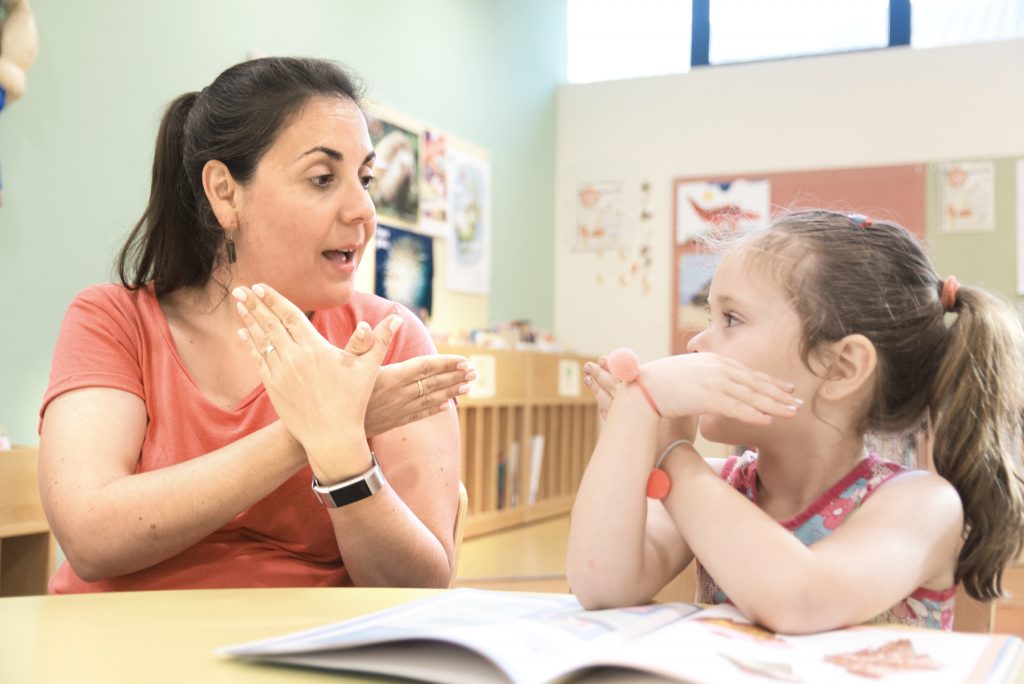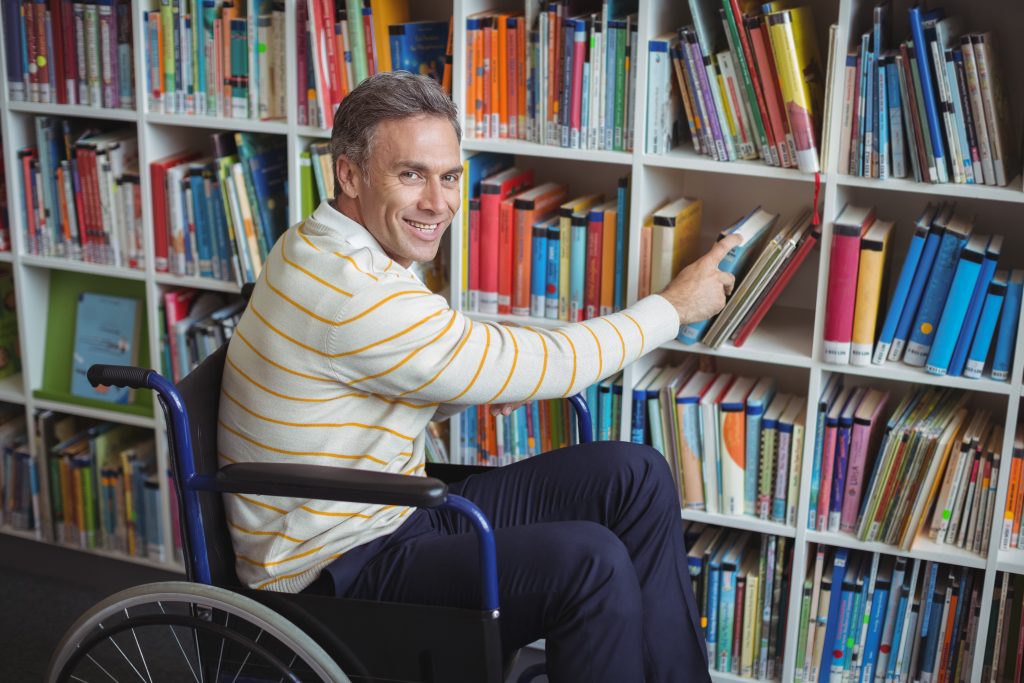Why consider working with a disabled tutor?
In an age where whole libraries can literally be held in one’s hand from practically anywhere in the world, teaching has fundamentally and irrevocably changed. The early-modern school system which took shape largely during the Victorian era saw facts become the centre piece of their approach. As the world becomes increasingly connected and more diverse, the Victorian objectives are as obsolete as they are potentially dangerous. A modern approach to teaching in an interconnected and diverse world means that a disabled tutor can bring new perspectives to education and broaden a student’s social experience.
Today’s world should be far more concerned with teaching people; not facts. Facts can often be found online with minimal effort, but how people react and interact with those facts is something that needs to be actively taught. Twenty-first-century teaching should seek to create valuable contributors to society who can effectively think for themselves. While many traditions from the Victorian schooling system still remain, it is vital that society moves away from creating fact-spouting parrots.
When it comes to choosing a tutor, then, one should consider more than just their academic qualifications and their ability to convey their subject knowledge. Rather, one should look at the various ways a tutor can convey not only their knowledge, but their experience to allow their students the best opportunities to advance in society. In today’s context, that should involve an acute understanding of multitude of different social groups, their concerns, and how those concerns affect interaction with those social groups. There would be distinct advantages, then, to having a tutor that would be well-placed to impart a broader education both academically and socially. This is where hiring a disabled tutor can be a real benefit.
Contact Aidan

The Silo Effect
Humans have arranged themselves into communities as a means of survival. As societies grew more complex, more communities arose and the boundaries between communities became more permeable. It’s reached a point where no one person is siloed into a single category—one can be Jewish, a woman, bisexual, and disabled and fitting into each of those communities while being a single, conscious being.
As outdated as silo-ing things into single categories is, it’s still human nature. We still seek to put things into boxes that we can easily control. Even though people exist across many ‘boxes,’ we find it difficult not to think of them in a single, easily understandable (or, at least, name-able) group. If one believes in the model of teachers as social educators and sees the benefits of a tutor from a different community, they’re faced with a different problem: which community to choose a tutor from. Ultimately, it comes down to individual priorities. Perhaps unlike other communities, though, Disability offers particular advantages that warrant further consideration.
The Universality of Disability
Given that there should be an emphasis on teachers educating people rather than teaching facts, a tutor’s dynamism and diverse knowledge base is all the more important. Having a tutor from a different community from their students, such as a disabled tutor, would pose obvious advantages. Different communities offer different perspectives which would undoubtedly allow new slants on subjects and topics which would benefit the students. While these differences are valuable, there is particular benefit to having a disabled tutor in terms of outside-classroom education.
Disability poses challenges, yes, but it is also universal. Each community faces its own challenges—think orientation, gender, religion—which shape people’s identity. If one wants to find a tutor who has a different social experience from the student, one might well take a community’s challenges into account. The ‘beauty’ of disability, though, is one doesn’t have to choose it ‘over’ another community. Although disability has been consistently discriminated against across societies, disability itself doesn’t discriminate. Every community has its own sub-group of disabled people. It is relatively easy to find a disabled person within another community.

Relevance of Disability and Disability Education on Modern Teaching
Disability is fundamentally about difference. While everyone is different regardless of disability, disability creates an entirely new set of experiences that fundamentally influence a person’s interaction with their environment in wholly unique ways. Given the extent to which a disability influences all elements of a person’s experience, it should be fairly obvious that their disability would have some influence over a teacher’s academic approach at all levels.
Arguably more important than any academic advantage a disabled tutor may provide, the benefits are far greater outside of the classroom. The twenty-first century is one of the most diverse and accepting periods in human history and it is becoming increasingly important to be aware of the nuances between social groups. One of the cornerstones of current social movements is not only are things becoming more accepting, but society is doing its best to correct previous injustices. While disability is not the only social group that has been continuously discriminated against and finds mentalities improving, it would be naïve to think that disabled people are fully accepted. More needs to be done to create widespread understanding of what disability is and how it affects people.
Book Aidan for History & English Tutoring
Social Consciousness Beyond Disability
It’s true that while disability education is not directly related to teaching, it’s becoming increasingly important in an accepting society. The need to understand nuances and people’s difficulties is vital but, at the same time, doesn’t need to take time away from more ‘traditional’ education concerns like subject-specific teaching. Having a disabled tutor, then, allows for one to maintain a key focus on academics while still exposing students to disabled people and disability. By virtue of interacting with a disabled person, be it in person or more tangentially, would begin to breakdown misconceptions people might have or, if they haven’t had time to form, stop them from crystallising altogether. While this would have obvious benefits for a person’s future interactions with disabled people and in a disability-conscious society, there are advantages further afield.
Fundamentally, by exposing people to the need to acknowledge difference, one creates an environment ideal to cultivate complex understanding and empathy. At the same time as allowing people to learn empathy more consciously, it provides an opportunity for them to learn that ‘empathy’ is not ‘pity.’ Ignoring the benefits at having a more advanced knowledge of disability has advantages, those advantages pale in comparison to the advantages of understanding appropriate social interaction across social groups.

Find out more about how Aidan can help your child learn
Is a Disabled Tutor Right for My Needs?
As with everything, whether one should hire a disabled tutor is down to the individual. It’s important to remember, though, that while there are numerous benefits to a disability—over and above those beyond academics mentioned above—there are some myths that need dispelling before one makes a final decision as to whether a disabled tutor is the right thing for you, specifically:
-
Disability somehow makes teaching more difficult on a practical level
It’s true that there are some changes that may need to be made as to accessibility but disability itself does not mean that teaching is impractical. This is especially true if the tutor works with a reputable agency like The Tutor Team that works with them to find solutions to potential issues.
-
Disabled Tutors are less academically qualified and therefore not as good.
True, there are some disabilities which make learning more difficult, especially with more ‘traditional’ subjects. That does not mean that all disabled people are the same. Many achieve high academic results with their disability, not despite it. Again, it’s your decision as to what qualifications would be sufficient for your purposes but there is no reason that disability should influence a tutor’s qualifications. You may wish to contact tutoring agencies for advice or look into a potential tutor’s qualifications.
-
Disabled people are less communicative.
Some disabled people find communicating difficult for various reasons, yes. That does not mean all are the same. As a tutor, especially with The Tutor Team, they would be good communicators and experienced in conveying their ideas and their subject knowledge.
-
I don’t understand a person’s disability or what that entails and don’t feel comfortable.
Feel free to contact them and ask. More often than not, they’ll be willing to help. If you don’t feel comfortable asking questions, feel free to look it up or contact people who may be more willing to help. There are plenty of disability blogs like The Diary of a Disabled Person who dedicate themselves to changing attitudes towards and about disability.
Should you wish to know more about the benefits of a disabled tutor or would like to investigate what to consider when choosing a tutor, feel free to contact The Tutor Team for advice.
Aidan is a History and English tutor for The Tutor Team. He is available for face-to-face tutoring in Wiltshire and by remote tutoring online.
Contact Aidan


